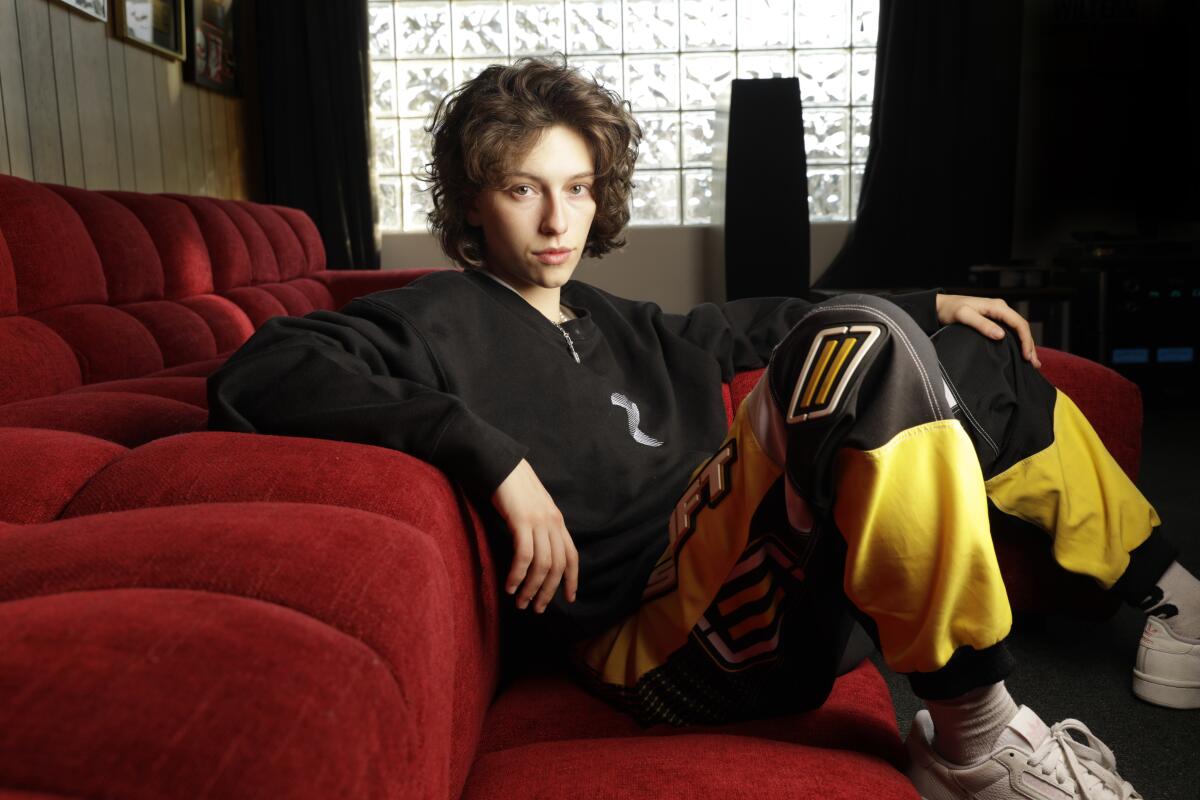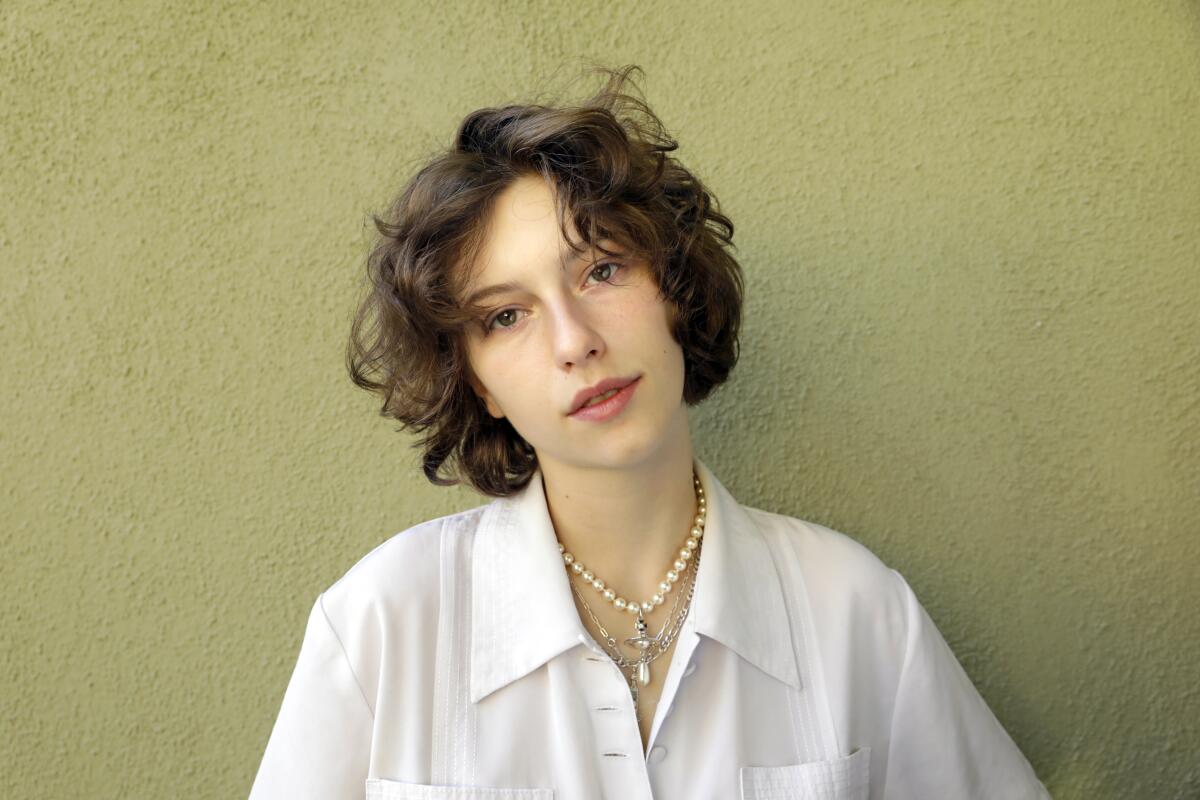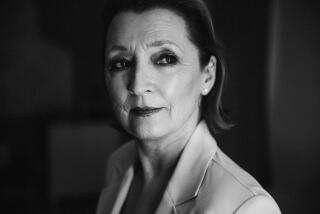Genderqueer pop sensation King Princess: ‘The tea is we’ve always been the tea’

Several days before the release of her debut album, the 20-year-old pop singer known as King Princess sat in a recording studio in Hollywood freaking out a little bit.
“The experience last time was so insular,” she said, referring to the creation of “1950,” the homemade love song that got her signed to producer Mark Ronson’s Zelig label and went on to become a viral streaming hit last year with more than 300 million plays on YouTube and Spotify. “Now there’s a fan base that knows my music and has seen me perform — real-ass people waiting to hear what I have to say.”
As she spoke, members of her team were readying Ronson’s studio for a listening party at which King Princess planned to play her debut album, “Cheap Queen,” for a few dozen of those fans; on the walls hung gold and platinum plaques commemorating the producer’s earlier successes with the likes of Adele and Lady Gaga. Her eyes widened. “It’s just very emotionally intense,” she said.

It wasn’t merely the pressure to live up to expectations that was getting to King Princess, whose real name is Mikaela Straus. Inspired by Patricia Highsmith’s “The Price of Salt,” a landmark of gay literature, “1950” introduced a self-identified genderqueer artist writing proudly about same-sex romance: “I hate it when dudes try to chase me,” she sings in her slurred, slightly raspy voice over a slowly tolling piano groove. “But I love it when you try to save me — ’cause I’m just a lady.” Which means the stakes for “Cheap Queen,” at least as King Princess sees them, are especially high at a time when pop music is broadening its representation of different points of view.
“I see the look in some of these kids’ eyes — that hunger for information about gay people,” she said. She knows the hunger because she felt it herself as a kid who scoured gossip columns for hints that some celebrity or another might be like her. “You know how many Justin Biebers there have been for straight girls to put a poster of on their wall?” She laughed. “Sometimes I think I’m more a vessel than a human because I’m providing this gay solace that queer people just haven’t had.”
“A sad heartbreak record,” as King Princess describes it, “Cheap Queen” is unstinting with details as she vividly charts the dissolution of a relationship between two lovers whose clothes share the same drawers. (Last year Straus broke up with the actress Amandla Stenberg; today she’s dating Quinn Wilson, a filmmaker who’s directed music videos for Lizzo.) But like “1950,” which glanced back shrewdly at an era of sexual repression, the new songs set that very modern story — “Watching my phone, thinking ’bout you, baby,” one of them goes — against arrangements that pull from vintage pop and R&B.
Dressed in a black sweatshirt and baggy yellow parachute pants, King Princess addressed her unique position as a line of young devotees lengthened steadily outside the studio hours ahead of that evening’s event. She said she recognized the importance of serving as an openly gay sex object — a figure with little visibility in mainstream music until recently — even though she gets “stressed out” by the unexpected physical demands of the job.

“It’s not OK to grab me,” she said. “That happens a lot, and it’s condoned because it’s queer and there’s no men involved. But no.” She also wondered whether the discussion of her sexuality was threatening to overshadow the particulars of her music, much of which she plays and produces herself. An animated talker who maintains near-constant eye contact, King Princess really lit up when our conversation turned to her discovery as a teenager of the work of revered session greats like singer Merry Clayton and bassist James Jamerson.
Did those old-fashioned affections make her feel out of step at the time with her Gen Z peers? “Well, I didn’t have a lot of friends, so that made it easier,” she replied with a grin.
What she did have as a child was access to professional recording gear, thanks to her father, an engineer with a studio in Brooklyn. (The singer’s great-great-grandfather was Isidor Straus, a co-owner of the Macy’s department store who died with his wife in the sinking of the Titanic.) By 12, King Princess was already laying down her own tracks; labels soon began sniffing around, but she decided she wasn’t ready to launch a career and left the environs of her arty-privileged upbringing to enroll in USC’s Thornton School of Music in 2016.
Asked what she thought she might learn, she admitted she wasn’t sure. She’d gone to a fancy private high school, though, and was “caught up in the competition” with wealthy classmates “who only cared about what college they were going to.”
Not long after she got to Los Angeles, “I got this horrible feeling that I was running out of time” to make her mark as a musician. For years she’d felt that she was supposed to be older than she was; then, suddenly, she was the right age to do what she wanted to do. Part of that was having the freedom to write about sex “once I wasn’t jailbait anymore,” she pointed out, laughing. Yet she was also keenly aware of how quickly pop has been aging down of late.
“This industry would like to have you believe I’m old,” she said, joking that Billie Eilish, who at 17 is the success story of 2019, is “15 years younger than me.”
Still, King Princess insists she’s glad she waited to link up with Ronson, who said her demo exuded a type of street smarts that reminded him of Lady Gaga and Alicia Keys when they were starting out. “No shade,” the singer said, “but if I’d been signed and developed from 15 or 16, I would not be a happy person. My parents were amazing about not selling me into child labor.”

The delay also gave her time to hone her sound, which on “Cheap Queen” seems to beam directly from her heart even as the music juggles varied beats and textures. Tobias Jesso Jr., the cult-favorite singer-songwriter who wrote several songs with King Princess and contributes backup vocals to a dreamy ballad called “Isabel’s Moment,” commends the “emotional honesty” of her stuff — the way she uses her powerful voice, with its dramatic swoops from low and throaty to high and breathy, to deliver “an undiluted-ness that feels real.” (Other pals featured on the album include Father John Misty, who plays drums on the swinging “Ain’t Together,” and Romy Madley Croft of the xx, who co-wrote “Homegirl,” a warmly sensual promise to “give you my body at home.”)
King Princess — based these days in L.A., which she called “a spooky town full of celebrity demons” — said she thinks of herself as a producer and instrumentalist more than as a singer. But she acknowledged that the rawness of her voice is an asset, one she’s grown proficient enough with that when she records a first-take vocal, she makes sure to use a good microphone, since it’s likely to end up in a song’s final mix.
Ronson, with an eye on his protégée’s future, said he’s been trying to convince her to “get off the Juul” and “learn how to manage her voice so she doesn’t lose it 10 years down the road.”
As she moves beyond internet renown to find a place in the wider world, King Princess is focused on the moment — particularly the progress signified by the ascent of someone like her.
“Think about how, not long ago, gay pop stars were described in the press as though they were doing something shameful,” she said. “George Michael, Elton John, Freddie Mercury — they were ridiculed!” Now, she added with a knowing chuckle, “everyone got woke and realized we’re all inspired by queerness.
“The tea is we’ve always been the tea.”
More to Read
The biggest entertainment stories
Get our big stories about Hollywood, film, television, music, arts, culture and more right in your inbox as soon as they publish.
You may occasionally receive promotional content from the Los Angeles Times.











